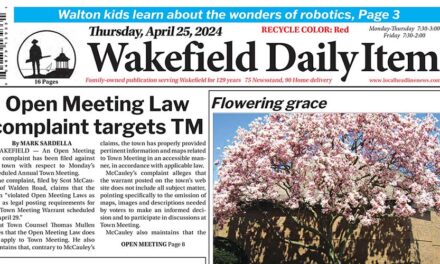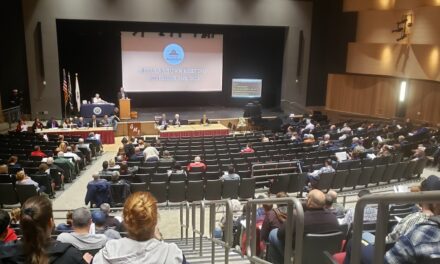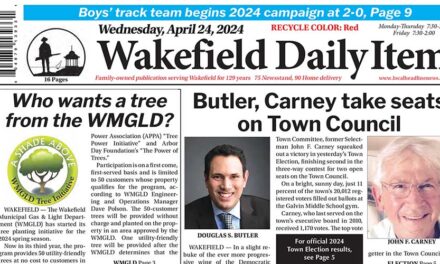Published in the June 16, 2017 edition.
By GAIL LOWE
WAKEFIELD — For many people, finding a career path that suits their skills and talents doesn’t come easy. The perfect match can be hit or miss.
But Sharon Gilley did find it. But on Friday, June 30, her career as director of the Lucius Beebe Memorial Library will come to an end. It is a job she has loved for 40 years. She agreed to speak with a Daily Item reporter to talk about her career, so here is what she had to say:
“I consider myself to be one lucky woman to have found work that was a perfect match for my talents and convictions,” she said.
Gilley called it a “privilege” to exercise the things she was good at and work on the ones she was not, all while in the company of people she liked and in service to a cause important to her.
Gilley said she could have made a big mistake by establishing a career in other fields she considered, such as social work.
“I would have been terrible at social work,” she said.
Gilley comes to Boston
When Gilley came to Boston with a bachelor of arts degree in French Linguistics from Bucknell University in Pennsylvania, she happened to have a politically active roommate who knew that the Somerville Public Library was looking for someone in the children’s room. The work struck Gilley as being socially useful.
She went on to practice being a children’s librarian at the Medford Public Library, where a patient supervisor helped her become better at her job.
“She urged me to take a course in teaching reading, which proved useful all my working years,” she said.
Gilley worked in Medford as a young adults’ librarian, then as librarian for a tiny branch, before becoming supervisor of their branch libraries. Along the way, she started work on a master of Library Science degree at Simmons College, and when she had four courses left to complete, she left Medford, paid the rent by waiting tables and tending bar and finished up her degree full-time.
Boston Public Library, founded in 1848, hired Gilley to work at its Charlestown branch as an adult services librarian.
She found Charlestown an interesting place, made more so by phenomena like court-ordered busing and the Blizzard of ‘78. “I learned crucial urban lessons, like how to save the parking space you shovel,” she said, tongue firmly planted in her cheek.
Gilley said she had a “really good boss” whose name was Margo Crist for some of those years.
“The thing about having a good boss is that you learn not only how to be a good employee, but also how to be a good boss yourself,” she said.
On Sundays, she worked at the main library in Copley Square. Boston Public Library was her first awareness of working within a well-established union, which became another learning experience.
She can recall with clarity coming to Wakefield days before her interview for the assistant director job. It was early spring in 1977, and she said the town looked like something from a picture book.
“I grew up in Baltimore, Md., a city surrounded by strong county governments,” she said. “These little autonomous New England towns were a curiosity. The library director at the time was Margo Trumpeter. She was very creative and collaborative, and she organized a staff softball team that played other libraries.”
Every staff member had to deliver a “how-to program” to a senior group. Gilley said she had recently learned to make pasta and did her best to demonstrate how to keep the egg from escaping the ring of flour and eventually bring the whole thing together into egg noodle ribbons.
“I can only imagine what those Italian grandmothers were thinking as they watched patiently,” she said, laughing.
Winds of change
When Gilley had been assistant director only a few months, Trumpeter left Wakefield for a job in Albuquerque, N.M.
Eventually, Gilley applied for the job.
“The Trustees were not unanimous about my appointment, so it was a rocky start,” she said. Meanwhile, the staff completed its inquiry into unionizing and voted to form a collective bargaining unit.
When Proposition 2½ passed, Gilley recommended closing the Greenwood and Montrose branch libraries.
She referred to it as a difficult time, and she wasn’t sure she had a future in public libraries, so she went back to school part-time to earn a master of business administration degree from Boston University.
“I had my first child before I finished that degree in 1987, followed by a second,” she said. Both children attended Wakefield public schools.
NOBLE is born
Meanwhile, Peabody Institute Library completed a renovation of its library, which included the introduction of the first computer system in a Massachusetts community library. Tom Scully, Peabody Library director at the time, wanted to expand the system capacity to include neighboring libraries, and four local libraries expressed interest – Wakefield, Lynnfield, Danvers and Beverly.
“I had a hard time locally explaining how this would all work, but the Peabody director and the system vendor offered help,” she said.
Wakefield’s Library Trustees and the Finance Committee decided it was probably the wave of the future and recommended funding the local match to a Library Services and Construction Act grant from the Massachusetts Board of Library Commissioners.
“We formed the first automated network in the state,” Gilley recalled. “Wakefield’s assistant director Tom Blumenthal and I came up with the title for the new organization – the North of Boston Library Exchange, or NOBLE.” Gilley said it seemed a bit self-congratulatory, but it was the best they could invent. NOBLE now counts 17 public libraries, ten academic libraries and one special library as members.
Beebe comes of age
Gilley spoke about the history of the town’s library, calling the original building an “unhappy conjunction” of the elegant 1920s Cram and Ferguson building with a 1960s Shepley Bulfinch addition that was constructed as economically as possible.
“The addition had concrete block walls, burnt orange shelving end panels and carpet that looked like artificial turf,” she said. Segments of the book collection were shelved where they could fit, leaving patrons puzzled as to why the 600s and 700s were not shelved between the 500s and 800s. There was not enough space for children’s services. The building needed to be wired for technology.
Then, in 1995, when the Massachusetts Board of Library Commissioners held its first grant round for library renovation and construction, the Beebe Library submitted an application.
The opportunity to redesign a library for better service delivery was the opportunity of a lifetime, said Gilley, and staff members were happy to be led through a process with CBT Architects.
“The renovation was a window into the fascinating world of building construction, about which I knew nothing,” she said. “While the library was gutted and rebuilt, we delivered library service from temporary headquarters at Lakeside Office Park in space made available by The Savings Bank.”
Gilley said she doesn’t understand why some directors change jobs when a construction project is completed. Unlike many others, instead of making a move, she looked forward to the payoff.
“We were able to install current technology, and we have kept it up. The library does a far better job introducing children to books and keeping them reading. A well-designed building is critical to good service delivery.”
She said that patrons describe the building as being both welcoming and elegant. “Some of that is attributable to the architecture; some is owing to the design services of Wakefield resident Cheryl Webb Scott, who has helped us adapt to change.”
“When we realized we needed more soft seating for people with laptop computers, we were able to create it in the center of a diminishing reference collection,” she said, adding that people came in twos and threes for foreign language practice, tutoring and playing video games.
“They consult their personal devices and they read the newspapers,” she explained. “The library is the place they come to learn something, meet somebody or just get centered to do that thing they can’t focus on at home.”
Moments of reflection
Though she held her job for 40 years, Gilley said she was never bored. Each day brought a new problem to solve.
She confided that she will greatly miss that part of her job. A problem solver at heart, she was happiest when trying to “loosen a knot.” She found it satisfying to think aloud with a colleague, most often Assistant Director Catherine McDonald, who says they “share a brain.” She also enjoyed writing and doing the math required to develop and administer a budget, liked getting new programs up and running, and learned to like investigating building problems.
“It is a great job for a dilettante,” she said, wistfully.
Gilley said that everything relates to librarianship.
“It’s not just the information component. It goes without saying that a broad base of general knowledge is valuable on the reference desk,” she said. “It’s more than that. I observe how fast food restaurants and banks handle customer service. Articles about brain development and education inform my thinking about service to children. Research on aging makes me think about service to seniors. I read pop psychology because it tells me useful stuff about human interactions. Everything is applicable to my work.”
When she wanted to evaluate the heat loss from her old kitchen door, Gilley thought about getting an infrared camera for the library. “I figured if I needed one, then my neighbors probably did, too. The Wakefield Municipal Gas & Light Department donated two.
“Service and retail businesses offer endless good and bad examples of procedures and problem solving that can be adapted to libraries,” she said. “I don’t know how I will stop noting these things now that I no longer have a place to apply them.”
Gilley said she got good at hiring the right people.
“Everyone who works at Beebe Library knows that the library exists at the pleasure of the taxpayers, and it’s up to us to figure out what the community needs next,” she said. “Whatever it was that motivated us to earn our degrees is irrelevant. It’s what we can envision for the residents of Wakefield that matters.”
Gilley said she has been delighted by employees who brought added value to their jobs — talents beyond the scope of their responsibilities like graphic design, editing, musicianship, coaching sport teams or knowing half the people in town and the names of their children and dogs.
Programs that make her happy
Ten years ago, both the library and the local Chamber of Commerce were desperate for money, so Blossoms at the Beebe was born as a wine tasting and flower show.
“After chairing the event for five years, I had nothing new to add,” she said. “Fortunately, Susan Wetmore stepped in and she has grown it to the splashy party and substantial fundraiser that it is now.”
The Wakefield Lynnfield Chamber of Commerce depends on Blossoms at the Beebe to make their budget and, once the library’s book budget dug out of the 2008 recession, the library used the proceeds to fund replacement of the library’s 18-year-old furniture and for programs like Plaza Jazz.
Gilley said that Plaza Jazz started when she was thinking about using the Main Street Plaza in ways that could attract people to the downtown. She found a key person at Berklee College who could provide bands all summer long.
“After some trial and error with Plaza Jazz, we figured out what kind of music works and we’ve had excellent, exuberant performers from all over the world play here in the suburbs every Thursday in June, July and August. I especially like it when families come and picnic on the lawn,” she said.
News & Views
A current events discussion group called News & Views meets twice monthly now. The library hires a moderator who prepares a summary of possible topics.
“It’s a small, simple way to practice the art of civil discourse, but even our small group goes off the rails from time to time,” she commented. “I practice the art of listening to understand. I’ve made some progress. It seems harder than it used to be for citizens to do that.”
Along the way, Gilley served on various boards and presided over some committees and made herself useful where she could. Librarians can build careers in a number of ways — by advancing to larger libraries and library systems, by running a consortium and by leadership in professional organizations. “Running a public library has always been what I found most absorbing, so I just put down roots,” she said.
An eye to the future
Once retired on June 30, Gilley looks forward to having a second cup of coffee and reading the paper on the patio in the summer and in front of the fireplace in the winter.
“I look forward to oceans of unstructured time,” she said. “I look forward to learning to cook decently, to figuring out something about the language of music, to getting more exercise, to seeing movies and plays and to reading whatever I want.”
“Just this month I took a trip with Margo Trumpeter, the former Beebe librarian who hired me,” she said. “I look forward to having more time for exploring with friends.”
Gilley also looks forward to giving her “good dog” Josie more attention and the opportunity to do some agility training. “Since you ask, I will tell you that she’s a miniature poodle, but she gets a regular puppy cut and I hesitate to tell people her breed because I expect they will dismiss her as being frou-frou. Poodles are athletes, and I consider her the thinking woman’s companion.
“Both of my children — Catrina and Eric — recognize what a gift it is to live in the Boston area. They have stuck around, and I’m grateful for that. Plus, my son married someone I like very much, and his wife Alison is going to make me a grandmother along about my last day of work. Now, that’s really something to look forward to!”




